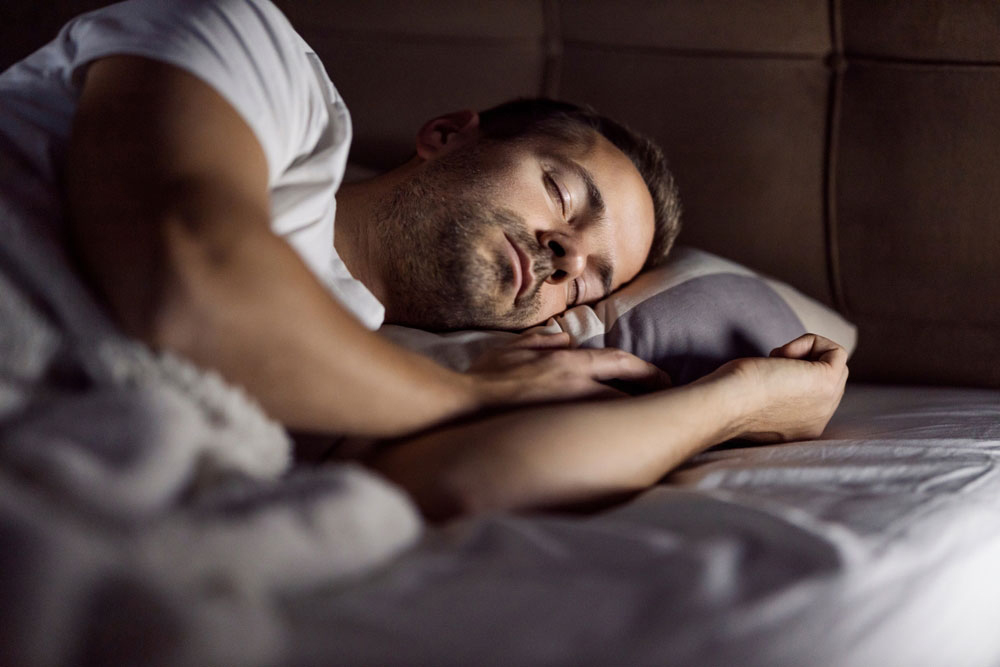Most of us know sleep is essential, but it’s often the first thing we sacrifice when life gets stressful. Whether it’s due to work, school, substance use or mental health issues, chronic sleep deprivation can derail every part of your life – from your physical health to your emotional resilience.
In honor of Sleep Comfort Month, here are some ideas for getting well-rounded rest in recovery.
Why Good Sleep Matters
While you’re off in dreamland, your body is busily repairing, resetting and rebalancing itself. Night after night, a lack of consistent rest will chip away at your cognitive function, emotional regulation and immune system response. Over time, sleep deprivation can contribute to serious health problems such as:
- Anxiety and depression
- Impaired memory and focus
- Hormonal imbalances
- Substance cravings and relapse
- Increased risk of heart disease, diabetes and obesity
For men in recovery, poor sleep can make it harder to stick with therapy, manage triggers or regulate mood swings – making quality rest a cornerstone of long-term success.
How Addiction and Mental Health Disrupt Sleep
Addictive substances like alcohol, marijuana and stimulants alter brain chemistry and wreak havoc on sleep patterns. Many people develop unhealthy coping habits like staying up late, doomscrolling or relying on substances to fall asleep. Even after you complete a medical detox program, sleep disruptions can persist due to lingering anxiety, depression or post-acute withdrawal syndrome.
Learning to sleep naturally, without self-medicating or using potentially habit-forming medications or supplements, is pivotal in healing from addiction and mental health challenges.
Practical Sleep Hygiene Strategies
Here are science-backed ways to improve your sleep hygiene and reclaim your nights.
1. Stick to a Consistent Schedule
Waking up and going to bed at the same time daily is the best way to regulate your circadian rhythm, the internal clock that governs drowsiness and alertness.
2. Create a Wind-Down Routine
Build a calming bedtime ritual that tells your body it’s time to relax and let go. Yours might include:
- Dimming the lights
- Doing a series of gentle yoga stretches
- Reading a hard-copy book
- Journaling or gratitude practice
- Deep breathing or meditation
Avoid stimulating activities like exercise, screen time or stressful conversations in the hour before bed.
3. Limit Stimulants
Skip the afternoon coffee or energy drink and put down cigarettes or a vape pen – caffeine and nicotine can disrupt deep sleep stages and increase wakefulness later in the night.
4. Make Your Sleep Environment Comfortable
Your bedroom should be cool, dark and quiet. Invest in a comfortable mattress and pillows and use blackout curtains, earplugs, a white noise machine or a fan to create a sleep-friendly atmosphere.
5. Avoid Long Daytime Naps
While a 20-minute nap can be a restorative reset, longer naps can throw off your sleep cycle, especially if you fall asleep too late in the day.
6. Cut Off Screen Time Early
Phones, laptops, tablets and TVs emit blue light that suppresses melatonin, the hormone that signals sleep. Try to disconnect from your devices at least 30 minutes before bed.
7. Don’t Try to Force Sleep
If you go to bed and are still wide awake a half-hour later, get up and do a quiet, relaxing activity like reading or deep breathing until you feel drowsy again. Tossing and turning is a waste of time and a surefire recipe for frustration, which will make it harder for you to fall asleep.
Sleep and Recovery Go Hand in Hand
At PACE Recovery, we emphasize sleep as a vital part of mental, physical and emotional recovery. Our programs help young men develop sustainable routines, rebuild their circadian rhythms and establish healthy sleep patterns as part of a comprehensive healing journey.
Help is available if substance abuse, mental health issues or chronic stress keep you up at night. PACE Recovery offers residential and outpatient programs designed specifically for young men seeking lasting change. Contact us today to learn how we can support your full-spectrum recovery – starting with better sleep.


